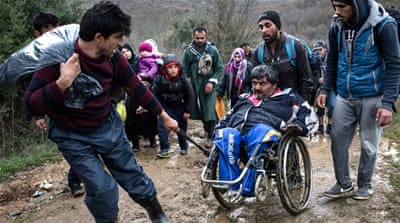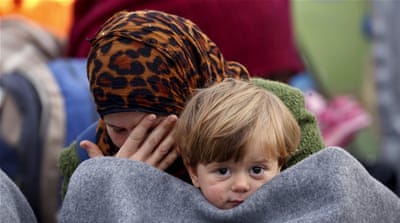Wolfgang Hampel - and Betty MacDonald fan club fans,
Wolfgang Hampel's Ma and Pa Kettle biography is much funnier than a Ma and Pa Kettle movie.
When Betty MacDonald's sister Alison Bard Burnett talkes
about her experiences with the Kettles even my mother-in-law is
laughing.
This is very surprising because she laughs very seldom.
We don't have neighbours like the Kettles. Our neighbours are like Mr. and Mrs. Hicks.
They have no children. We have a boy and two girls. Mr. and Mrs. Hicks are cutting down everything in the garden. Ours looks like a paradise or a green hell with many trees and branches. Mr. Hicks always says to us: If you need help I'll cut everything down for you but we refuse so far. We have two dogs. Mr. and Mrs. Hicks don't like dogs or cats because Mrs. Hicks is very allergic. By the way we won't ever have any chickens although is seems that our children bring a new pet home every day. I know what they are talking about when they say: Mother, we have a surprise! You won't believe it! ( I do! )
Mrs. Hicks is cleaning the house night and day and is called ' our newspaper' because she knows everything about the people in our community.
You know I thought it was a very witty idea to lend our Mrs. Hicks Betty MacDonald's The Egg and I which she wasn't aware of. After she read Betty MacDonald's book she said smiling: It was very funny but I dislike this awful Mrs. Hicks. She obviously doesn't understand the meaning of life. I couldn't say anything and looked at her with an open mouth. Mrs. Hicks gave me a strange look and said: Darling, is everything ok with you? You look terrible this morning!
I want to share a very special Betty MacDonald family story. My grandmother wrote letters to Betty MacDonald, Mary and Sydney Bard because she loved Betty MacDonald's and Mary Bard's books. She was very fond after she got delightful letters written by Betty MacDonald, Mary Bard and even from mother Sydney Bard. I'll write a Betty MacDonald Fan Club Article about it.
My girls and I like like Betty MacDonald's Nancy and Plum, The Egg and I, Anybody can do anything and Onions in the Stew. My hubby as he has the same profession as Mary Bard's husband Dr. Clyde Jensen prefers Betty MacDonald's The Plague and I and Mary Bard's The doctor wears three faces. Our boy likes the Mrs. Piggle-Wiggle Stories. He always says: I don't behave like the boys and girls in the books and don't need a Piggle-Wiggle cure. I'm not sure. Not at all!
We can't wait to read Gwen Grant's books. We are very fond of Monica Sone's Nisei Daughter. Monica Sone, who is Kimi in Betty MacDonald's The Plague and I, is our favourite person in Betty MacDonald's books.
We would like to visit the state of Washington, Seattle, Laurelhurst and Vashon Island and attend one of Darsie Beck's workshops.
Congratulations! Betty MacDonald Fan Club has the most interesting and fascinating Betty MacDonald Honour members.
Thank you, guys! I'm one of you!
Gracia
Don't miss this very special book, please.
Betty MacDonald forum
Wolfgang Hampel - Wikipedia ( English )
Wolfgang Hampel - Wikipedia ( English ) - The Egg and I
Wolfgang Hampel - Wikipedia ( German )
Vashon Island - Wikipedia ( German )
Wolfgang Hampel - Monica Sone - Wikipedia ( English )
Wolfgang Hampel - Ma and Pa Kettle - Wikipedia ( English )
Wolfgang Hampel - Ma and Pa Kettle - Wikipedia ( French )
Wolfgang Hampel in Florida State University
Betty MacDonald fan club founder Wolfgang Hampel
Betty MacDonald fan club interviews on CD/DVD
Betty MacDonald fan club items
Betty MacDonald fan club items - comments
Betty MacDonald fan club - The Stove and I
Betty MacDonald fan club groups
Betty MacDonald fan club organizer Linde Lund
Rita Knobel Ulrich - Islam in Germany - a very interesting ZDF ( 2nd German Television ) documentary with English subtitles

Gracia
Don't miss this very special book, please.
Vita Magica
Betty MacDonald fan clubBetty MacDonald forum
Wolfgang Hampel - Wikipedia ( English )
Wolfgang Hampel - Wikipedia ( English ) - The Egg and I
Wolfgang Hampel - Wikipedia ( German )
Vashon Island - Wikipedia ( German )
Wolfgang Hampel - Monica Sone - Wikipedia ( English )
Wolfgang Hampel - Ma and Pa Kettle - Wikipedia ( English )
Wolfgang Hampel - Ma and Pa Kettle - Wikipedia ( French )
Wolfgang Hampel in Florida State University
Betty MacDonald fan club founder Wolfgang Hampel
Betty MacDonald fan club interviews on CD/DVD
Betty MacDonald fan club items
Betty MacDonald fan club items - comments
Betty MacDonald fan club - The Stove and I
Betty MacDonald fan club groups
Betty MacDonald fan club organizer Linde Lund
Linde Lund shared Rita Knobel-Ulrich's photo.
efugees
Reporter's Notebook
Refugees stuck in Idomeni: Questions but no answers
Thousands stuck at a makeshift camp across Greek-Macedonian border are clueless about what is going to happen next.

About the Author
Zeina Khodr
Roving Correspondent
During the past three days at the makeshift camp across Greece's border with Macedonia - all we heard were questions.
People don't know who to believe. There are a lot of rumours, a lot
of misinformation and - deliberate or not - the thousands of refugees
and migrants are being kept in the dark, deceived and misled.
We were aware that a group of refugees were planning to push their way across the border on Sunday morning.
The people behind the plan were those who have been trying to convince people not to move into government-run accommodation centres.
They want people to stay at Idomeni because their presence attracts the world's cameras - and hope it will pressure EU leaders to revise their decisions.
READ MORE: Inside Idomeni refugee camp, nothing left but hope
But information about the planned march was not disseminated on social media. Instead people were told the border was to open.
While we were driving to Idomeni, we saw dozens of migrants and refugees carrying their belongings and walking for kilometres in the cold.
"We are so happy," Mahdi, a Syrian Palestinian told me. "Finally we can cross."
There has been no official announcement that the border is to open, we told him. Mahdi and the others with him refused to believe that. They kept walking, only to find dozens of refugees preparing to break through Greek police lines.
It didn't take long before they changed their minds. They realised that crossing the border by force would not change anything. They have attempted that in the past, only to be arrested by Macedonian authorities and sent back.
IDOMENI: On the brink of a humanitarian catastrophe
And so they announced that they wouldn't be marching. "We are peaceful people," one man said on the loudspeaker. "We won't cross unless the Red Cross is with us and there is a decision by the European Union to let us in."
Instead they held a peaceful protest and sent a message to the world not to forget them.
It was clear that as days pass, more and more of the 50,000 refugees and migrants who are stuck in Greece are resigned to the fact that Europe's open-door policy has been shut.
They cling on to hope that things will change but deep in their hearts they know they are trapped.
They come to us, journalists seeking answers to questions. Is it true that they are taking people to military camps? Is it true we will be sent back to Turkey? Should we agree to move to government-run centres? Are conditions better there? Is it true we will be given priority if we stay at the border?
There are others who are now talking about going back home. "How can we do that? I heard they are giving free tickets so that we can go back. Where do we go to get those tickets?" - were questions we heard from quite a few people.
READ MORE: A day in Idomeni
The UNHCR and other aid agencies do have offices at the makeshift camp where people have been struggling to survive in the cold and rain for weeks now.
But they don't seem to have all the answers - and they are overwhelmed.
Others are now accepting that they may have to wait months or even years before their asylum requests are processed or they are relocated under an EU plan.
Chaos, uncertainty, suffering, desperation, frustration - that is the atmosphere in Idomeni today.
And it is not only in Idomeni. Just travel a few kilometres along the highway to Thessaloniki, and the mood is similar among refugees and migrants who live in tents near petrol stations.
"I only have 40 euros left and I want to save it to pay for the taxi
to go to the border. Do you think it will open soon?" Abu Hassan, a
refugee from Syria, asked us.
It is hard to tell people that they may be holding on to a dream. "Greek authorities are taking people to centres where they can live while they wait for their papers to be processed," we explained.
He was shocked. "What buses? What accommodation centres? Where can we find these buses? How can we apply?" Abu Hassan asked.
The EU may have decided on how it wants to deal with the migrant crisis but it seems to have failed to give these people the answers they are desperately seeking.
We were aware that a group of refugees were planning to push their way across the border on Sunday morning.
The people behind the plan were those who have been trying to convince people not to move into government-run accommodation centres.
They want people to stay at Idomeni because their presence attracts the world's cameras - and hope it will pressure EU leaders to revise their decisions.
READ MORE: Inside Idomeni refugee camp, nothing left but hope
But information about the planned march was not disseminated on social media. Instead people were told the border was to open.
While we were driving to Idomeni, we saw dozens of migrants and refugees carrying their belongings and walking for kilometres in the cold.
"We are so happy," Mahdi, a Syrian Palestinian told me. "Finally we can cross."
There has been no official announcement that the border is to open, we told him. Mahdi and the others with him refused to believe that. They kept walking, only to find dozens of refugees preparing to break through Greek police lines.
It didn't take long before they changed their minds. They realised that crossing the border by force would not change anything. They have attempted that in the past, only to be arrested by Macedonian authorities and sent back.
IDOMENI: On the brink of a humanitarian catastrophe
And so they announced that they wouldn't be marching. "We are peaceful people," one man said on the loudspeaker. "We won't cross unless the Red Cross is with us and there is a decision by the European Union to let us in."
It was clear that as days pass, more and more of the 50,000 refugees and migrants who are stuck in Greece are resigned to the fact that Europe's open-door policy has been shut.
They cling on to hope that things will change but deep in their hearts they know they are trapped.
They come to us, journalists seeking answers to questions. Is it true that they are taking people to military camps? Is it true we will be sent back to Turkey? Should we agree to move to government-run centres? Are conditions better there? Is it true we will be given priority if we stay at the border?
There are others who are now talking about going back home. "How can we do that? I heard they are giving free tickets so that we can go back. Where do we go to get those tickets?" - were questions we heard from quite a few people.
READ MORE: A day in Idomeni
The UNHCR and other aid agencies do have offices at the makeshift camp where people have been struggling to survive in the cold and rain for weeks now.
But they don't seem to have all the answers - and they are overwhelmed.
Others are now accepting that they may have to wait months or even years before their asylum requests are processed or they are relocated under an EU plan.
Chaos, uncertainty, suffering, desperation, frustration - that is the atmosphere in Idomeni today.
And it is not only in Idomeni. Just travel a few kilometres along the highway to Thessaloniki, and the mood is similar among refugees and migrants who live in tents near petrol stations.
 | |||
| Refugees shout slogans during a protest demanding the opening of the border between Greece and Macedonia in the northern Greek border station of Idomeni [Darko Vojinovic/AP] |
It is hard to tell people that they may be holding on to a dream. "Greek authorities are taking people to centres where they can live while they wait for their papers to be processed," we explained.
He was shocked. "What buses? What accommodation centres? Where can we find these buses? How can we apply?" Abu Hassan asked.
The EU may have decided on how it wants to deal with the migrant crisis but it seems to have failed to give these people the answers they are desperately seeking.
Content on this website is for general information purposes only. Your comments
are provided by your own free will and you take sole responsibility for any direct
or indirect liability. You hereby provide us with an irrevocable, unlimited, and
global license for no consideration to use, reuse, delete or publish comments, in
accordance with Community Rules & Guidelines and Terms and Conditions.






DEMOGRAPHY GREATER MANCHESTER
Indian, Pakistani, Bangladesh: 131.182
Black or Black British: 29,747
Mixed black, asian, other 31,901
Arab, other ethnicities 7,297
-------
Professionally unemployed 200.127 (1% of the total population)
2015 - 2016 Average 01/2016
Anti-social behavior 10,000
Robbery 300
Burglary 2,500
Vehicle crime 2,000
Violent crime 5,000
Drugs 400
Criminal Damage and arson 3,000
Shoplifting 1,500
Bike/Theft from the person 800
Other theft 2,000
Weapons Jumped from 97 in 01/2015 to 140
Public Order 1,000
Other crime 300
Approximate toal 30,000
Immigration law makes a distinction between Skilled Workers and fugitives ('refugees').
The latter do not master western languages and do not have the required proficiencies for suitable employment. They habitually descent on the black economy and/or into the criminal world
"Forcible entry is defined by Merriam-webster's Dictionary of Law as the unlawful taking of
possession of real property by force or threats of force or unlawful entry into or onto
another's property, especially when accompanied by force."
"The crime of taking possession of a house or other structure, or land by the use of
physical force or serious threats against the occupants. This can include breaking windows,
doors, or using terror to gain entry, as well as FORCING THE OCCUPANTS OUT BY THREAT OR
VIOLENCE AFTER HAVING COME IN PEACEFULLY.
BURGLARY - Legal dictionary dot com
The offense is usually treated as a felony, meaning that convicted individuals face a year
or more in prison.
These people seem to think they have a right to enter countries without authorisation , and must be told that they will not be accepted.
Also why does not the press help , and tell and show these migrants about the growing number of migrants who have decided to go back home , as they did not find what they wanted in Europe . Also the journalists should tell these migrants that there are 20+ million unemployed in the EU , and the economies are failing , so there will be few jobs for them .
Also it is stated that these people need help and are destitute , yet they found thousands of dollars for the trip , which is more than many Europeans ever have in their lives , so get the factrs right and tell the truth .
The austerity policies came from Germany not the EU initially , so get the facts right.
Whose side they fight on is their problem , not others , and Syrians themselves started thgeir war on their own .